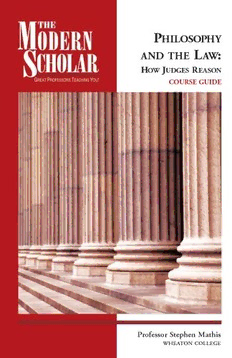
Philosophy and the law : how judges reason PDF
Preview Philosophy and the law : how judges reason
P HILOSOPHY L : AND THE AW HOW JUDGES REASON COURSE GUIDE Professor Stephen Mathis WHEATONCOLLEGE Philosophy and the Law: How Judges Reason Professor Stephen Mathis Wheaton College RecordedBooks™isatrademarkof RecordedBooks,LLC.Allrightsreserved. PhilosophyandtheLaw: HowJudgesReason ProfessorStephenMathis (cid:1) ExecutiveProducer JohnJ.Alexander ExecutiveEditor DonnaF.Carnahan RECORDING Producer-DavidMarkowitz Director-MatthewCavnar COURSEGUIDE Editor-JamesGallagher Design-EdwardWhite Lecturecontent©2008byStephenMathis Courseguide©2008byRecordedBooks,LLC 7 2008byRecordedBooks,LLC Coverimage©ChristianHesse/shutterstock.com #UT120ISBN:978-1-4361-2909-1 Allbeliefsandopinionsexpressedinthisaudio/videoprogramandaccompanyingcourseguide arethoseoftheauthorandnotofRecordedBooks,LLC,oritsemployees. CourseSyllabus PhilosophyandtheLaw: HowJudgesReason AboutYourProfessor...................................................................................................4 Introduction...................................................................................................................5 Lecture1 LegalRealism........................................................................................6 Lecture2 LegalPositivism,PartI..........................................................................9 Lecture3 LegalPositivism,PartII.......................................................................12 Lecture4 TheoreticalDisagreementinLaw........................................................15 Lecture5 TheoriesofInterpretation....................................................................19 Lecture6 LegalConservatism.............................................................................23 Lecture7 JudicialActivism..................................................................................26 Lecture8 LawasIntegrity...................................................................................29 Lecture9 CommonLawandStatutes.................................................................32 Lecture10 ConstitutionalLaw...............................................................................36 Lecture11 DualistDemocracy...............................................................................40 Lecture12 RegimePerspective.............................................................................44 Lecture13 InterpretiveSynthesis..........................................................................48 Lecture14 JudicialPoliticsversusInterpretation..................................................52 CourseMaterials........................................................................................................56 3 Mathis Stephen About Your Professor of courtesy Stephen Mathis Photo StephenMathisisanassociateprofessorandchairmanofthePhilosophy DepartmentatWheatonCollege.Heteachesavarietyofcoursesinlegalphi- losophyaswellasinsocial/politicalphilosophy.ProfessorMathisisalsothe co-coordinatoroftheLegalStudiesMinorandPre-LawAdvisor.Hisprimary researchinterestisthephilosophyofcriminallaw,buthehasalsowrittenon topicsinpoliticalphilosophy,moraltheory,andethics.Inhissparetime, ProfessorMathisfollowspoliticsandtheSupremeCourtverycloselyandhas authoredop-edpiecesonconstitutionallawissues. Thefollowingbooksprovideanexcellentsupplementtothelectures foundinthiscourse: Ackerman,Bruce.WethePeople:Foundations.Cambridge,MA:Belknap Press,1993. Dworkin,Ronald.Law’sEmpire.Newed.Oxford:HartPublishing,2003. 4 m Hesse/shutterstock.co Christian © Introduction Dojudgesdeducetheirdecisionsfromlegalrulesandprinciples,ordothey decidecasesbasedonwhatisfairgiventhefactsathand?Thelatterview, heldbyLegalRealists,servesasthestartingpointforProfessorStephen Mathis’seye-openinglookathowjudgesreason.Inthiscompellinglecture series,theesteemedprofessoraddressessuchissuesaswhetherthelawis distinctfrommorality.ProfessorMathisalsoattemptstoidentifyaviewthat offersguidancetojudgesindecidingcases,andonethatwillprovidethe toolspeopleneedtoevaluatetheinterpretationsanddecisionsjudgesmake. 5 Lecture1: LegalRealism TheSuggestedReadingsforthislectureareJeromeFrank’s“Legal Realism”inJoelFeinbergandHymanGross(eds.)PhilosophyofLaw andOliverWendellHolmes’s“ThePathoftheLaw.” WebeginthiscoursewithLegalRealismbecauseitmarksoneoftheear- liestattemptsattakingaphilosophicalapproachtoAmerican Jurisprudence.AresponsetoLegalFormalism(theviewthatjudgescan anddologicallydeducedecisionsfromapplyinglegalprinciplestothe factsofthecase),LegalRealismfocusesinsteadonhowthingsaredonein theactualpracticeoflaw.AlmostalloftheLegalRealistswerejuristsand legalpractitioners,andnotacademicphilosophers.Perhapsforthisreason, LegalRealistsdrewmorefromsociologicalapproachesthanphilosophical ones.However,theirattentiontoempiricalclaimsabouthowjudgesactually decidecases(andnotabouthowjudgesshoulddecidecases)ledlater philosophersoflawtodiscountLegalRealismasadeeplyflawedapproach tojurisprudence. LegalRealism,especiallyasweseeitembodiedintheworkofOliver WendellHolmesandJeromeFrank,offersastartlingaccountofwhatlawis: itis,fundamentally,amatterofpredictinghowjudgeswillactuallydecide cases.Thisaccountisstartlingbecauseatfirstblushitseemstosuggest thatpriorcourtdecisions,statutes,andlegalprinciplesarealllessimportant thanthejudge’sparticularleanings(orthan“whatthejudgehadforbreak- fast”1).Iftrue,theRealistviewofthelawwouldbeadeeplyskepticalview, holdingthattheprocessofadjudicationisnothingmorethananelaborate sham,withallsortsofwindowdressingforwhatisessentiallythejudge’s subjectivepreference. WhileLegalRealismdoesespouseadegreeofskepticismaboutthelaw andespeciallyaboutadjudication,itisunfairtoseeitascomingdownjustto “whatthejudgehadforbreakfast.”Itisimportanttokeepinmindthatmost LegalRealistswereconcernedwiththelawprimarilyfromtheperspectiveof alawyer,notthatofajudge,aSupremeCourtJustice,oraphilosopher. (Holmesalsousesthislawyerlypointofviewtodriveadistinctionbetween moralityandlaw:hearguesthatthelawandmoralityarelikelytooverlapfor thegoodman[orclient],butallthatmatterstothebadmanisthelaw.) Treatedasanempiricalclaimaboutthelawyer’srolewithrespecttoher client,sayingthatthelawisessentiallyamatterofpredictinghowjudgeswill decidecasesseemsfarlessobjectionable.Afterall,ajudgeisahuman beingwhohasbiasesandidiosyncracies,someofwhichcanleadhimaway fromortoholdaskewedviewofparticularlegalrules,precedents,andprinci- E N ples.ButLegalRealistsdonotbelievethatthelawisaboutpredictionjust O E R U T 1.Realistshavelongbeensaddledwithclaimingthat“whatthejudgehadforbreakfast”isthedeter- C miningfactorinjudicialdecisions.However,noRealistactuallyevermadesuchaclaim.SeeBrian E L Leiter,“LegalRealismandLegalPositivismReconsidered,”Ethics,111:2(2001),p.281. 6 becausesomejudgeshaveprejudicesorfoibles:Realistsalsodonotbelieve thatthevariouslegalrulesandreasonsthatbearonagivencaseactually justifyorrequireoneparticularrightwayofdecidingthatcase.Inother words,LegalRealismholdsthatthelawisindeterminateorundeterminedby thelegalrulesandreasonsavailabletojudges.ItisinthiswaythatRealism isskepticalaboutlaw.Intheend,thisskepticismleadsRealiststoseejudges playingakeyroleindeterminingthelaw,whichinturnleadsRealiststodis- cussthelawintermsofpredictingoutcomes. LegalRealistsholdthatmostjudgesdonotdeducetheirdecisionsfrom legalrulesorprinciples,butrathertheydecidecasesbasedontheirviewof whatisfairgiventhefactsathand.Thisisnottosaythatjudgesignore statutesorotherlegalrulesorprinciples,butratheronlythatdifferentjudges willinevitablyinterpretorweighlegalrulesandreasonsindifferentways, andthere’snothinginthelawthatpreventsthemfromdoingso.Itisalsoto say,however,thatjudgessometimesdecidecasesbasedonextralegal judgmentsaboutwhatisfairorjust,andthentheyuselegalrulesandrea- sonstojustifythosedecisionsafterthefact. Overall,LegalRealismisbestunderstoodasasociologicalordescriptive theoryoflawandadjudicationinthatittellsuswhatlaw isandhowjudgesactuallydodecidecases.Legal Realismfails,however,toofferanormativeorpre- scriptivetheoryoflaworadjudication,oratheoryof whatthelawshouldbeorhowjudgesoughtto decidecases.Eventhoughinrealityjudgesmaytypi- callydecidecasesaccordingtowhattheythinkisfair giventhefactsofthecase,thattellsusnothingabout whetherornotitisrightorevenacceptablefor themtodoso.AndwhileLegalRealismrecog- nizesarangeofpossibleinterpretationsof existinglegalrulesandprinciples(thatcon- tributetolaw’sindeterminacy),itoffersnoway toevaluateinterpretationsaswithinthatrange orunacceptably“outthere.”Infact,Legal Realismoffersnomeansatallofevaluating judges’decisionsandthuscansaynothingat allabouthowajudgeshoulddecideapartic- ularkindofcaseoraboutwhyaparticular decisionmayormaynotbejustified.While LegalRealismhasinterestingthingstosay abouttheactualpracticeofthelawandthe wayjudgesdecidecases,philosophersoflaw (nottomentionjudges)needmorefroma jurisprudentialtheory:weneedaviewthat willoffersomeguidancetojudgesindeciding casesandonethatwillgiveusthetoolswe m nineteerdprtoeteavtiaolnusataen,damdeocnisgioonthsejurdthgiensgsm,athkee. Jones/shutterstock.oc Erick © 7 FORGREATERUNDERSTANDING (cid:1) Questions 1.WhyisLegalRealismagoodstartingpointforacoursefocusedonhow judgesreason? 2.FromwhatperspectiveweremostLegalRealistsconcernedwiththelaw? Suggested Reading Frank,Jerome.“LegalRealism.”PhilosophyofLaw.8thed.Pp.125–127. Eds.JoelFeinbergandHymanGross.Belmont,WA:Wadsworth PublishingCompany,2007. Holmes,OliverWendell.“ThePathoftheLaw.”Vol.10.HarvardLaw Review,p.457,1897. Other Books of Interest Frank,Jerome.LawandtheModernMind.Reprint.Piscataway,NJ: TransactionPublishers,2008. Holmes,OliverWendell.TheCommonLaw.NewYork:Dover Publications,1991. Leiter,Brian.“AmericanLegalRealism.”TheBlackwellGuidetoPhilosophy ofLawandLegalTheory.Pp.50–66.Eds.W.EdmundsonandM.Golding. Oxford:Blackwell,2003. Websites to Visit OliverWendellHolmes’sTheCommonLawandabookformofThePathof theLawarealsoavailableonlinefromProjectGutenberg— www.gutenberg.org E N O E R U T C E L 8 Lecture2: LegalPositivism,PartI TheSuggestedReadingforthislectureisH.L.A.Hart’sTheConcept ofLaw,chapterV,“LawastheUnionofPrimaryandSecondaryRules,” pp.79–99. LegalPositivismtracesitsrootsbacktothefamousutilitarianJeremy Bentham(1748–1832).ThoughBenthamwroteextensivelyinpoliticalphi- losophy,itwashisstarpupil,JohnAustin(1790–1859),whorefinedand codifiedmanyofhisviewsonjurisprudence.Austin’sworkhelpedlaunch anapproachtothephilosophyoflawwenowcall“AnalyticalJurisprudence,” becauseofitsfocusonanalyzingandtryingtodefinetheconceptoflaw.1 Thedefinitionsof“law”Austinandhismostinfluentialsuccessorsofferedall describedlawintermsofitsrootsinsocialpractice.Thesephilosopherswere mostconcernedwithlawasitisposited(thatis,asitisconstructedorprac- ticed,orperhapsevenasitisputintoplace),andnotwithlawasitwouldbe bestjustifiedinmoralterms;thusthelabel“LegalPositivism.” InhisTheProvidenceofJurisprudenceDetermined(1831),Austinseeksout theessentialfeaturesoflaw,andinparticulartriestodistinguish“law”from otherthingsthatmightbeconfusedwiththatconcept.Austindefines“law”as “commands,backedbythreatofsanctions,fromasovereign,towhompeople haveahabitofobedience.”Austin’skeyinsighthereisthatlawhasapeculiar kindofforce,aforcewecannotignore,aswecanignoremereexpressionsof wishes,especiallyfromthosewithnopowertomakeuswanttofulfillthose wishes.Thisforce,whichobligesustoact,istobedistinguishedfromreward orbeingprovidedpositiveincentivetoact,sincearewardmaynotmoveone toact—andifitdoesn’tsomoveone,oneis madenoworseoff.Thethreatofpain,under- stoodaspunishmentorfines,hastheforce Austinhasinmindhere.ForAustin,lawisalso generalinitsscope:itappliestotypesof actions,nottooneisolatedactononeparticular occasion.Thus,asovereign(whetherakingor alegislatureorotherlegitimateauthority)com- mandthatJoeSmithwearbluepantsonthe fourthofOctoberthisyearwouldnotbealaw, whileacommandthateveryonewearblue pantsonthefourthofOctobereachyearcould boainebtgio.entdTeiher(sreniibncrleecyeqcsuapoirnenecembifeciecans,natoniondofettt-obhtieemcaiepnpecttouhopremelehmt’shaaibshniatdcbosoi)fnt.uosBabidlueetyr-- man/shutterstock.com moreimportantly,thestipulationthatpeople MaiseiRa © 1.ThisfocusistobecontrastedwithNormativeJurisprudence,whichcentersonthelawasit shouldbe. 9
